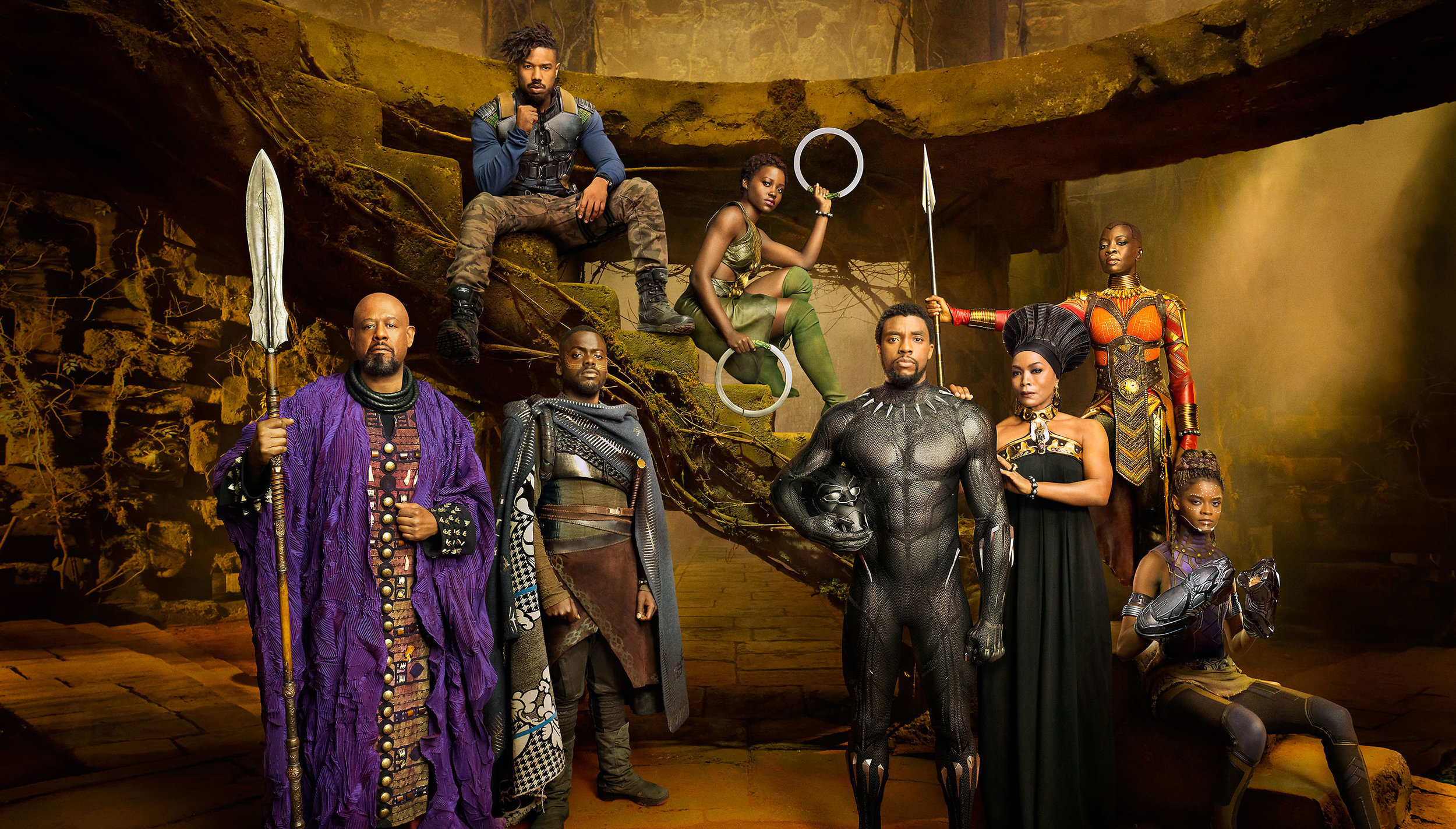Film Review: The King Returns in "Black Panther"
Black Panther isn't the first black superhero to headline his own film.
He's not even the second, lest we discount Blade, Steele, and Hancock. But he is the first big screen black superhero who is allowed to be boldly comic book heroic instead of coolly aloof, embarrassingly goofy, or Will Smith (see again: Blade, Steele, and Hancock, respectively).
For black kids everywhere, Black Panther will be the first time they'll see themselves reflected, not merely positively, but dazzlingly, superhumanly. Director Ryan Coogler has those boys and girls in his mind and heart, because Black Panther doesn't open with a bombastic action scene in Fairyville, but in 1992, Oakland, California, with a few young African-American boys playing basketball in a crummy neighborhood. There's a self-consciousness to this. However, Black Panther calls back to this opening scene twice - once in the middle, once at the end - with real emotional heft.
But positive representation aside, is Black Panther a good, solid movie? Yes. Perhaps not terribly giddy though. There's little room for the quippy wit that coloured Whedon's otherwise straightforwardly plotted Avengers, or the footloose and fancy-free shenanigans that livened up Iron Man's standard issue origin story. It has more in common with the brisk, business-like tone of Captain America: Civil War, the film that introduced the titular Black Panther/T'Challa (Chadwick Boseman).
But make no mistake, Black Panther is consistently entertaining, even occasionally channeling the joie de vivre of an old Bond movie. Also in its favour, is that it distinguishes itself from the increasingly impenetrable-to-newcomers mythology Marvel has been building with their Avengers adjacent films, barring one obligatory post-credits sequence. That being said, I'm still so damn excited for the fierce and formidable Wakandan army to kick alien ass and take alien names in Avengers: Infinity War after seeing them cut loose in Black Panther.
Oy, the day that the Marvel machine relinquishes my balls from its vice-like grip is a long way away.
But I digress. For the uninitiated, T'Challa is the newly crowned king of the most technologically advanced nation on earth, Wakanda, a hidden utopia of Afro-futurist aesthetics and sounds. T'Challa's antagonist is a militant American named Eric Killmonger (a lethally confident Michael B. Jordan), a young man of equal gravitas and magnetism. His methods are heinous, but his grievances are understandable. Their battle will determine who will earn the mantle of the Black Panther and the responsibility of Wakanda.
There is, of course, some racial commentary. That needle is threaded into the film in surprisingly subtle ways, such as with Martin Freeman's well-intentioned but ever suspicious CIA agent Everett Ross. In other ways, it's not subtle, such as with Andy Serkis' delightfully dastardly thief Klaue, the very model of a thuggish coloniser, who refers to the Wakandans as “savages”. But, this being a mainstream action/fantasy picture engineered to entertain folks of all races and ages, the shades of grey and truth-to-power script can only thoughtfully muddy this dazzling, glittery movie to a certain extent. Still, that the "angry black man" villain is allowed to be charismatic and sympathetic – sexy, even – is worth noting.
We saw what Boseman brought to the table as King T'Challa in Captain America: Civil War. He continues that good work here, imbuing T'Challa with a subtle layer of sophisticated, mellow confidence that might be mistaken for woodenness. He's supported by Wakandan warriors Nakia (Luptia Nyong'o) and Okoye (Danai Gurira), and his younger genius sister Shuri (Leitita Wright), who supplies Black Panther with all the cool gadgets and sleek, cat-like super suits. Incidentally, Wright comes very close to stealing the show with her boundless zeal and effervescence. Nyong'o is as slyly graceful as an old-time movie starlet and Gurira is a radiant fusion of honour and strength. It'd be a perfectly balanced ensemble if the elders, Angela Basset and Forrest Whitaker, didn't draw the short straw in terms of characterisation and screen time.
The Cast of Black Panther. Credit: Disney/Marvel Studios
In some other areas too, Black Panther is short-changed. Often the visual effects and compositions lack the flair and polish of its Afro-futurist art design. The action is competent if unmemorable, save for a kinetically directed car chase scene in nighttime South Korea. The dialogue, though not exposition-y or clunky, nonetheless sometimes has this curiously arrhythmic quality that's hard to describe but you know it when you hear it; it just sort of hits the ears in a displeasing way.
If these flaws are also present in other Marvel flicks and are worth mentioning here too, it's only because Black Panther is a hugely ambitious, classically told story. Hell, it borders on Shakespearean at times. And the final scene isn't the requisite pause before the next Marvel movie, but a genuine Moment. It's an emotionally rousing expression of why this movie matters, flaws and all.







